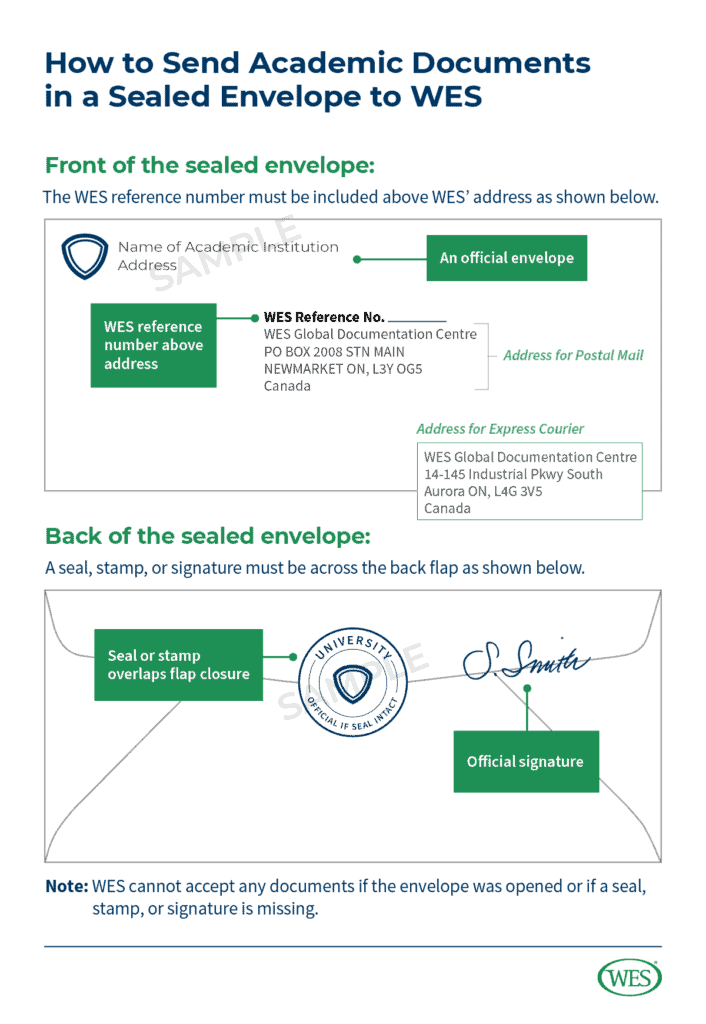How to Send Your Documents to WES in a Sealed Envelope
Friday | March 1, 2024 | by WES Advisor

A WES evaluation report serves not only as a credential evaluation but also an authentication of academic qualifications. This means that, in addition to providing an educational equivalency, WES verifies document authenticity. As part of the authentication process, WES requires that the appropriate educational authority seal documents and send them directly to WES.
Below are the answers to frequently asked questions about sending sealed envelopes to WES.
Does my reference number belong on my documents or the envelope?
To make it easier for our staff to match your documents with your account, please put your reference number on the front of the envelope.
You do not need to place it on the individual documents.
Refer to the image below for guidance.

Should I send my own photocopies in addition to the documents in the sealed envelope?
No. WES will only evaluate documents sent in the format stated on our website.
Which documents need to be sealed?
This varies based on your country or territory of education. The Required Documents page on our website will tell you which documents need to be sealed and which documents, if any, can be sent as photocopies.
Many higher education institutions can now securely transmit your documents to us electronically, thus eliminating the need for a sealed envelope. Inquire with the institution(s) where you studied whether this is an option for you. If they are not currently set up to transmit in this way, we encourage you to have a representative from the institution Contact Us. We will then explore electronic transmission opportunities with them.
I am having trouble obtaining my documents in a sealed envelope. What should I do?
Many of our customers no longer live in their country or territory of education. In this case, we generally recommend sending the Academic Records Request Form to your institution so they can release your documents.
If your school has closed, please contact our Customer Service (United States/Canada) team.
Individuals educated in Afghanistan, Eritrea, Iraq, Syria, Türkiye, Ukraine, or Venezuela who no longer have access to their academic documents may be eligible for the WES Gateway Program.
Does the Academic Records Request Form need to be sealed?
Although the form is not an official document (unless otherwise specified in your Required Documents), WES will only accept it if it arrives in a sealed envelope. Please note that if your institution sends your documents to us electronically, the Academic Records Request Form is not needed.
How do I send translations if my transcripts are already sealed?
You can upload some documents—including degree certificates and translations—online through My Account.
How do I send my documents if I obtained credentials at multiple universities?
You will need a separate sealed envelope for each institution. Check Required Documents to see if your institutions can send your documents to WES electronically. Otherwise, you might encourage them to initiate a digital partnership with WES.
Do I need to send my passport, birth certificates, or other official documents?
No, WES only needs the documents listed on our Required Documents page. If our evaluators determine that they need additional documentation, they will request it directly.
It will take a long time to have my documents sent to WES. Will my account stay open?
Yes. There is no deadline to submit your documents to WES. We will put your file on hold until we receive all documentation necessary to complete an evaluation.
Related Reading
Tips for Completing Your WES Application
How to Send Electronic Academic Records to WES
How to Upload Your Degree Certificates and Translations to WES